Fueled to advance voting engagement, increase equity, and other changemaking
Nazareth's social innovation conference inspires and guides students
Social innovators who are removing barriers to employment, increasing accountability in policing, educating on Indigenous history, preparing future professionals to address ethics in technology — and more — inspired and guided Nazareth students at an on-campus changemaking conference.
After a panel discussion; workshops led by community leaders, faculty, staff, and alumni; and working in teams on solution ideas for community challenges, students said they plan to use what they learned at Nazareth's Social Innovation Hack-a-Thon 2021 to advance change for the public good on issues that matter to them.
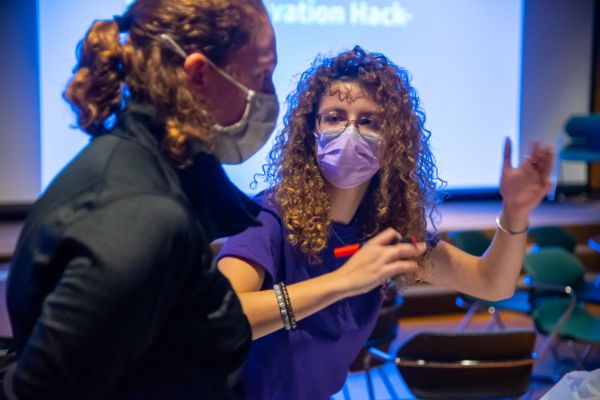
During the conference's "hack" competition, Mary Rose Utter '21, '23G (left, a speech-language pathology graduate student) and Mikayla Faas '23 (social work) collaborated on ideas to educate community members on anti-racism.
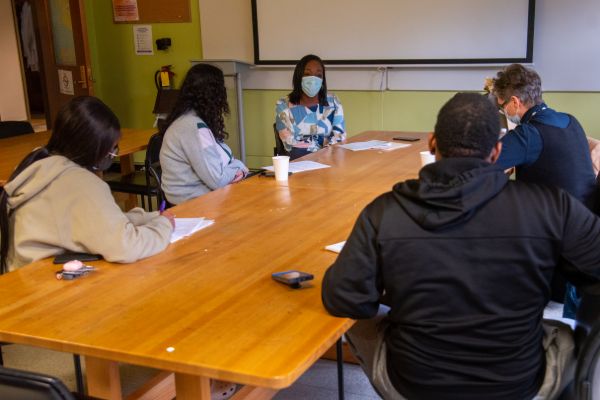
Natalie Banks, chief of public affairs & community engagement for the Rochester Police Accountability Board (facing camera), spoke to attendees about the board's work.
Cameron Perez '20, '23G gained new insights into her work getting students registered to vote and politically engaged: "I have a new view of why I do what I do, and that is to help students make change and be changemakers themselves." She is a graduate assistant in the NazVotes initiative on campus and is earning a master's degree in higher education and student affairs administration. "The conference reiterated the importance of helping students create the change they want to see," she said.
Tegan Wright '22, a sociology major, said she learned about police policies that can disproportionately affect certain groups of people, as well as how inequality can be built into artificial intelligence technology. As a student of mixed Seneca descent, she also appreciated learning more about Seneca history — including "the impact that publishing companies in Texas have on the inclusion of Native American people in history textbooks," Tegan said. "As of right now, the state of Texas is attempting to ban the teaching of the genocide that took place, and continues to take place, against Native Americans and this is impacting the inclusion of real history in textbooks around the U.S. as the majority come from and are published in the state of Texas." She wants to see tribal sovereignty — land and decision-making — returned to Indigenous nations and tribes.
Tegan said she has been telling friends and family members what she learned. She also planned to share information with classmates and through organizations she leads; she is president of the Women and Gender Studies Student Association and a student leader of the Association of Earth-Based and Indigenous Spirituality and Justice (AEBIS&J).
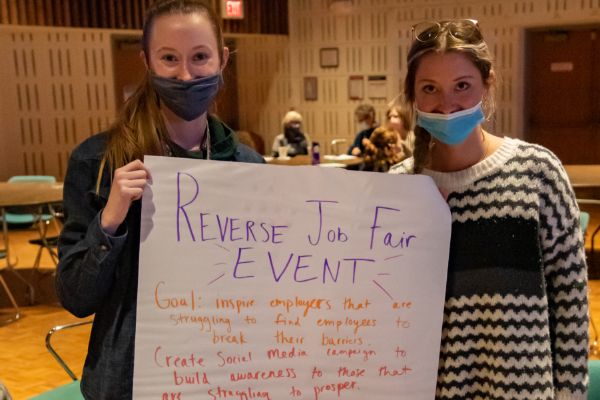
Marlayna Wertz '24 (on the left) and Marlaina Giurastante '22 recommended a reverse job fair and social media campaign for employers struggling to find employees.
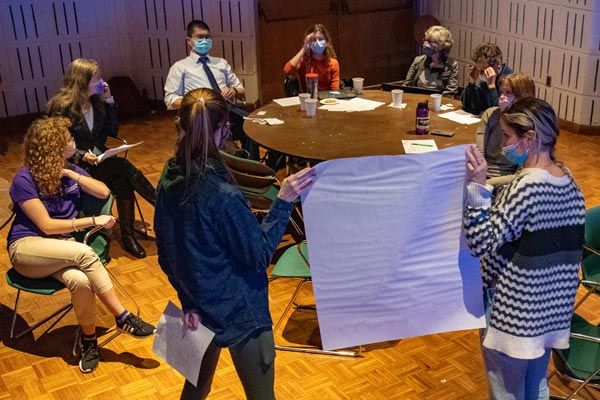
Teams presented their ideas to faculty, staff, community leaders, and other attendees.
Marlaina Giurastante ‘22 (business management major, marketing minor), whose team won the hack-a-thon competition portion of the conference, said the conference enhanced skills “that will help me be a leader and lead others to desire changemaking.” She is taking a leadership and ethics class and sees herself as a changemaker. The conference emphasized the value of collaboration and offered inspiration, she said: “Something that really struck me was this: During the panel discussion, President (Beth) Paul said, ‘Change is inevitable, but progress is a choice.’ I hope I keep this at the forefront of my mind when I am faced with challenging tasks and conversations now and in the future.”
Mary Rose Utter ‘21, ‘23G who’s getting a master’s in speech-language pathology at Nazareth, helped plan the conference and said she benefited from that experience — realizing her own skills in collaboration and creativity — as well as from learning how local organizations are enacting change.
In her profession, she said, “I want to make speech and language intervention more accessible to individuals in diverse populations. I plan to do this by tailoring my therapy to each of my clients and finding new ways to reach clients who might be experiencing barriers to treatment.”
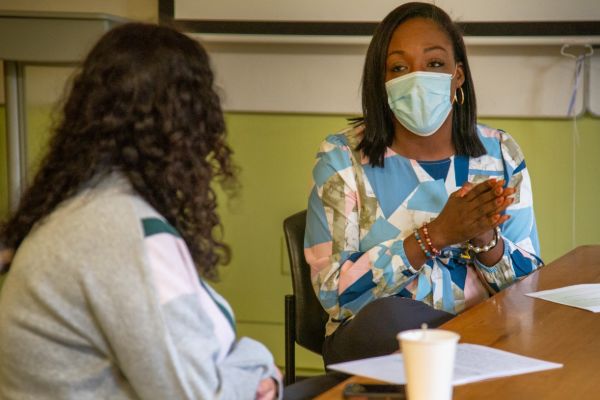
When pursuing equity within organizations, be sure to understand policies and budgets, said Natalie Banks of the Rochester Police Accountability Board (right): "Budgets are moral documents." The independent, community-led board was created in 2019. At left: Miranda Luis '24, who's taking a Changemakers Leadership course at Nazareth.
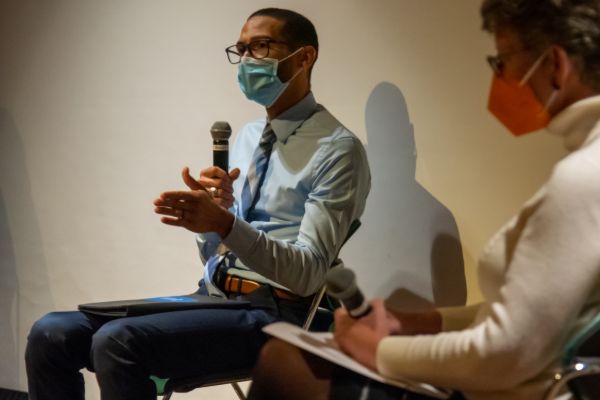
Mubarak Bashir (left), regional director for Greyston Center for Open Hiring, said networking has helped him reach employers about the benefits of hiring without background checks, interviews, and drug tests. Panel moderator Beth Paul (right), Nazareth College president, said, “Our founders were very, very enterprising, daring, people. That is the spirit of this community now.”
Attendees started with an overview of Nazareth's Changemaker framework from Adam Lewandowski, Nazareth's associate director of civic engagement, and Jennifer Leigh, Ph.D., professor of management in the School of Business and Leadership. The framework teaches seven mindsets — among them empathy, inclusivity, understanding context and history, believing transformation is possible and seeing that you play a role in that, and persevering when you don't see results immediately — that are important to make advancements ethically, equitably, and effectively.
Tegan, who took a Changemaker Leadership course taught by Lewandowski and Leigh, said, "It was really my time here at Nazareth that made me see myself as a changemaker." She also credited professors Devparna Roy, Ph.D., and Yamuna Sangarasivam, Ph.D., saying all four instructors "inspired me and encouraged me enough to feel as though I could actually make a change in my community."
Definition
Social innovation = a new solution to a social problem that is more effective, efficient, just, or sustainable than current solutions and particularly benefits society rather than private individuals.
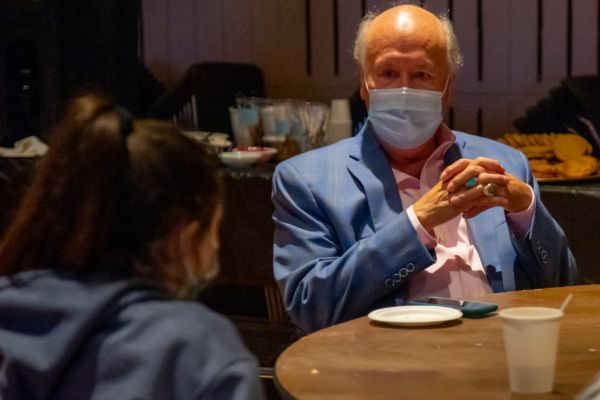
G. Peter Jemison, manager for Ganondagan State Historic Site and an artist, said when he studied art education in college, he never saw any art produced by Native Americans. Since then, he has directed a Native American art gallery, organized festivals where artists could display and sell their work, and curated art shows — including for Nazareth and other area colleges.
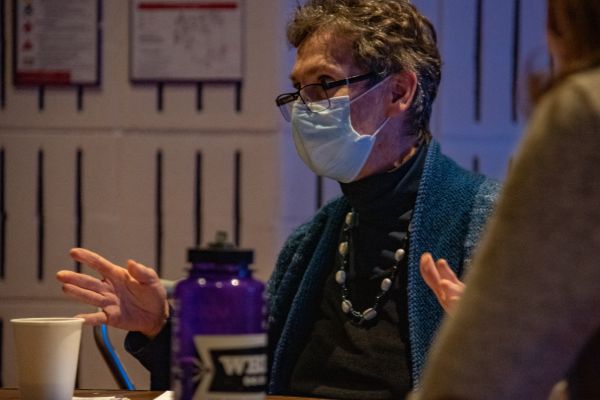
Joy Bergfalk, executive director of Coffee Connections, said, "All of the crises going on in the world are connected."
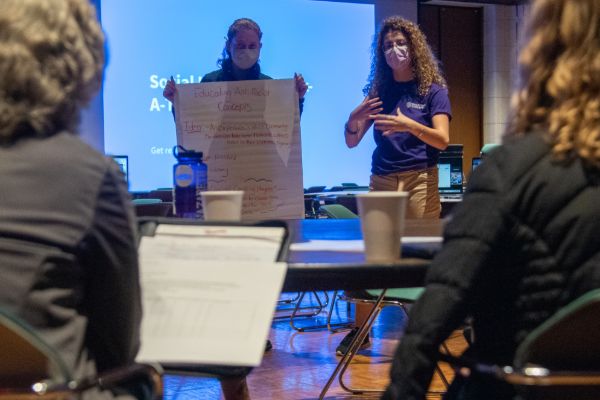
Mary Rose Utter '21, '23G (standing with paper) said she benefited from being part of the conference.
Promoting Social Innovation
The event was co-sponsored by these Nazareth departments/programs: